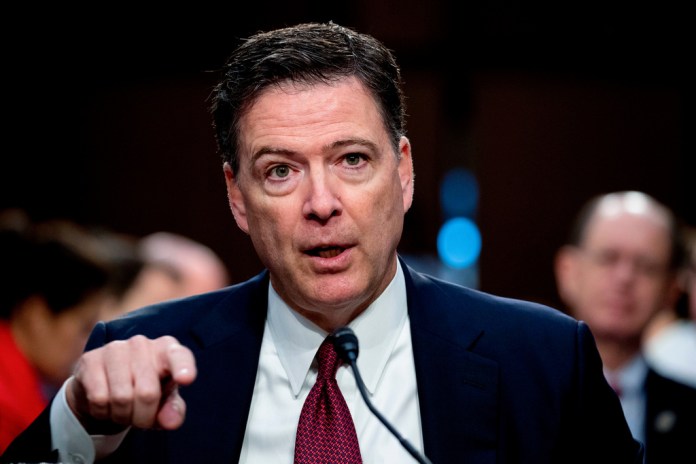Federal prosecutors revealed Monday that they have obtained a series of personal emails showing former FBI Director James Comey closely tracked, and at times encouraged, an associate’s efforts to anonymously shape news coverage in the final stretch of the 2016 election.
The details were contained in a wide-ranging filing submitted by acting U.S. Attorney Lindsey Halligan and her deputy, Tyler Lemmons, who told a federal judge their case is rooted in Comey’s own words, not political payback. The lead prosecutors argue the messages directly undercut Comey’s sworn testimony before Congress in September 2020 that he never authorized such communications, and leave little doubt Comey was aware his close confidant Daniel Richman was serving as a conduit to key journalists.

One of the most striking exchanges came when Richman, a Columbia Law professor appointed as a special government employee at the FBI, briefed Comey on his contact with the New York Times as coverage intensified over the FBI’s handling of former Secretary of State Hillary Clinton‘s classified emails. “Well done my friend. Who knew this would [be] so uh fun,” Comey replied in early November 2016.
Richman, a longtime friend of Comey who later represented him as an attorney, has long acknowledged to agents that he communicated with New York Times reporter Michael Schmidt to “correct stories critical of Comey [and] the FBI” and to influence future coverage, according to internal memos referenced in Monday’s filing.
Yet, Comey has pleaded not guilty to charges of making false statements and obstructing Congress when he testified in 2020 that he stood by earlier statements, insisting he had not approved unnamed intermediaries to speak to reporters about sensitive investigations into Clinton’s private email server and alleged Trump-Russia collusion. His legal team is seeking to have the case dismissed, arguing the prosecution is fueled by President Donald Trump’s personal “spite” against the former director.
Federal prosecutors took aim at Comey’s retaliation claim by presenting new evidence that ultimately boosts the credibility of their indictment. They argued that publicly available statements by Trump — including attacks on Comey as a “leaker” — show a legitimate basis for investigators to scrutinize whether any classified or sensitive information was released, and whether Comey lied about those actions afterward.
Prosecutors included additional emails showing Comey believed his actions would ultimately be vindicated by a Clinton win. On Oct. 30, 2016, the day after he informed Congress that new Clinton emails had been found, he emailed Richman: “Some day they will figure it out … my decision will be one a president elect Clinton will be very grateful for (although that wasn’t why I did it).”
The next day, Richman emailed that he had pressed New York Times reporters to better appreciate the significance of Comey’s July announcement clearing Clinton of criminal wrongdoing. Using the email “[email protected],” Comey replied back: “Pretty good,” sending along a link to a New York Times article and saying one reporter “showed some logic,” according to the government’s Exhibit 7.
gov.uscourts.vaed.582136.138.7 by reportoftheday
“The correspondence occurred via the defendant’s personal email account and Mr. Richman’s use of an email account associated with Columbia University,” the main filing noted.
Prosecutors said Comey’s messaging with Richman was part of a broader pattern. They pointed to Richman’s later role in 2017 in helping Comey leak private memos documenting conversations Comey had with Trump, which ultimately spurred a special counsel investigation against the president.
The filing also previewed additional evidence prosecutors may use at trial: handwritten notes showing Comey was briefed in September 2016 on intelligence that Clinton’s campaign approved a political plot to tie Trump to Russian hacking, according to Exhibit 13 from the government. During Senate testimony in 2020, Comey said the Clinton plan intelligence did not “ring any bells,” adding that he did not remember receiving anything matching that description.
gov.uscourts.vaed.582136.138.13 by reportoftheday
Halligan wrote that Comey’s notes, recovered from a secure FBI compartment, read: “HRC plan to tie Trump.” She said the document is directly relevant to whether Comey misled lawmakers about his awareness of that intelligence.
Prosecutors said those handwritten notes were recovered only recently after FBI investigators stumbled on a little-used secure room at headquarters, Room 9582, containing five “burn bags” filled with classified records.
According to the filing, the bags included materials from the Mar-a-Lago search, the Jan. 6 Capitol breach investigation, and the Crossfire Hurricane investigation into alleged Trump-Russia collusion, as well as a classified appendix to Special Counsel John Durham’s 2016 report. Most significantly, investigators found what they described as the original CIA referral to Comey, dated Sept. 7, 2016, summarizing intelligence about Clinton’s plan to invent the Trump-Russia narrative and flagged as a “Counterintelligence Operational Lead.”
That referral was located in a storage closet adjacent to the FBI director’s office. Prosecutors said Comey later testified he was unfamiliar with both the referral and “its related intelligence,” a claim they now argue is disproven by its discovery.
THE ROLE OF A COMEY CONFIDANT TAKES CENTER STAGE IN DOJ’S LEAK CASE
In court filings, Comey’s lawyers argue that conversations about press strategy fall squarely within his right to seek accurate media coverage as the head of the FBI. They say the criminal charges wrongly criminalize a senior official’s interactions with the press and raise First Amendment concerns.
A hearing has been set for Nov. 13 to consider Comey’s parallel challenge to Halligan’s appointment. It will be heard by a judge from South Carolina, Cameron McGowan Currie, who has agreed to combine Comey’s challenge to Halligan with another one from New York Attorney General Letitia James, who is facing separate charges related to mortgage fraud allegations tied to her Norfolk, Virginia home.
